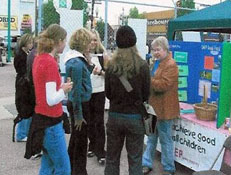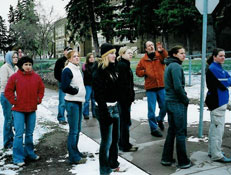IICUSP - International Interdisciplinary Community-University Student Partnership
Across the River, Around the World: University and Community Building Common Ground
IntroductionIICUSP brings together the U of S Health Sciences programs and a number of community-based organizations active in Saskatoon’s core neighborhoods into an “outside-the-institutional-walls” learning partnership with local and global dimensions. Goals & Objectives
|
 |
Target Population
- University students and faculty in Nursing, Physical Therapy, Nutrition, Dentistry, Medicine, Pharmacy, Kinesiology
- Community-based organizations active in Saskatoon’s core neighborhoods, including Quint, CHEP, Westside Community Clinic, Aids Saskatoon,White Buffalo Youth Lodge.
- Training for Health Renewal Program in Mozambique.
Project Overview
IICUSP continues to offer interdisciplinary learning experiences to students:
- Community plunges in Saskatoon’s core neighborhoods.
- Practicum experiences with CBOs in Saskatoon and in Mozambique.
IICUSP collaborates with and assists other interdisciplinary and service learning initiatives with community engagement and outreach efforts.
IICUSP is in the process of conducting a formal evaluation of its model, to inform long-term development and sustainability of IICUSP.
Results & Progress To Date
- Over 500 students have participated in plunges.
- Over 40 students have had practicum experiences with CBOs in Saskatoon’s inner city.
- Some 36 students have had placements in Mozambique.
- Plunge module has been updated.
- Evaluation: Content analyses of plunge feedback is complete. Key informant interviews and follow-up questionnaires in development.
Quotes from Students:
|
“The community experiences confronted my stereotypes and introduced me to interesting and innovative initiatives that are already underway in which community people themselves are active participants.” “As a university student I spend much time focused on books and in the classroom; the community plunge put me in the so-called ‘real world’ where I recognized that core neighborhood issues are everyone’s issues.” |
 |

